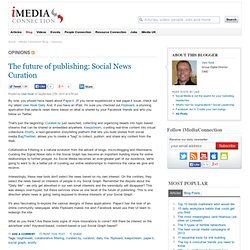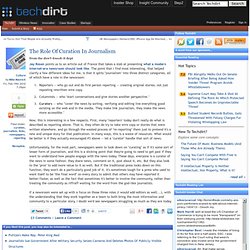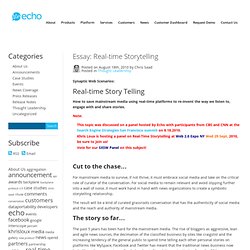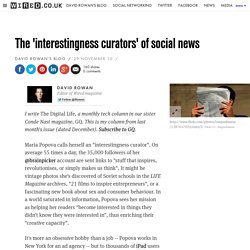

Media Curation Is Now Consumer-Generated. SXSW blog, day three: Meet the curators. Craig Newmark on editors and news curation. The future of publishing. By now, you should have heard about Paper.li.

(If you never experienced a real paper.li issue, check out my latest Uwe Hook Daily And, if you have an iPad, I'm sure you checked out Flipboard, a stunning application that selects news items based on what is shared by your Facebook friends and who you follow on Twitter. That's just the beginning: Curated.by just launched, collecting and organizing tweets into topic based streams that can be shared or embedded anywhere. Keepstream, curating real-time content into visual collections.Storify, a next-generation storytelling platform that lets you build stories from social media.BagTheWeb, allows you to create a "bag" to collect, publish, and share any content from the Web. Collaborative Filtering is a natural evolution from the advent of blogs, micro-blogging and lifestreams. Curating the Signal:Noise ratio in the Social Graph has become an important building stone for online relationships to further prosper.
Can 'Curation' Save Media? The importance of news curation and distribution. The Role Of Curation In Journalism. Jay Rosen points us to an article out of France that takes a stab at presenting what a modern internet-era newsroom should look like.

The point that I find most interesting, that helped clarify a few different ideas for me, is that it splits "journalism" into three distinct categories, all of which have a role in the newsroom: Reporters -- who go out and do first person reporting -- creating original stories, not just reposting rewritten wire copy. Columnists -- who "start conversations and give stories another perspective. " Curators -- who "'cover' the news by sorting, verifying and editing live everything good existing on the web and in the media. They make link journalism, they make the news more accessible. " Now, this is interesting in a few respects. Curation & Realtime Storytelling. Posted on August 18th, 2010 by Chris Saad Posted in Thought Leadership Synaptic Web Scenarios: How to save mainstream media using real-time platforms to re-invent the way we listen to, engage with and share stories.

Note: This topic was discussed on a panel hosted by Echo with participants from CBS and CNN at the Search Engine Strategies San Francisco summit on 8.18.2010.Khris Loux is hosting a panel on Real-Time Storytelling at Web 2.0 Expo NY Wed 29 Sept, 2010, be sure to join us! Curation in Social Media. Curation, the word of 2008-2009 within the eCommerce world, popularized first by the entertaining shopping site Woot, has now officially expanded to the social media space (see examples).

It used to be the long tail that made the internet so full of potential, but it seems information reached its peak and we can no longer search, find and make sense of it ourselves. We only need one result–maybe even just one result per day–if we’re expected to take any action. And action is the key word here. Even Google has tried to make search easier. Instant search gives you exponentially more results but more importantly, allows you to self-curate as you type each little letter of your inquisition. The 'interestingness curators' of social news. David Rowan Editor of Wired magazine I write The Digital Life, a monthly tech column in our sister Conde Nast magazine, GQ.

This is my column from last month's issue (dated December). Subscribe to GQ. Maria Popova calls herself an "interestingness curator". It's more an obsessive hobby than a job -- Popova works in New York for an ad agency -- but to thousands of iPad users @brainpicker now serves as a radical new form of daily magazine. In his prescient 1995 book Being Digital, Nicholas Negroponte, the visionary founder of MIT's Media Lab, described how customised daily news would one day find you through "personal filters" that would understand your desires and interests. Welcome to the new era of social curation. Popova, for one, is convinced. It seems I'm not alone: a Pew survey of more than 2,200 Americans recently found that 75 percent of news consumed online was via links from social networking sites or email. It's a welcome trend -- with two qualifications.